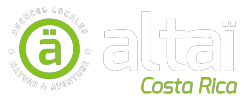FAUNA AND FLORA WITH YOUR FAMILY
Itinerary
-
Day 1 JUAN SANTAMARIA AIRPORT- SAN JOSÉ
In the afternoon, settling into our accommodation and welcome, our local team is in charge.
Transportation: 30 minutes-1 hour by bus.
Accommodation: Hotel.
Meal(s) at the client's expense: All. -
Day 2 LA FORTUNA - DANAUS ECOCENTER
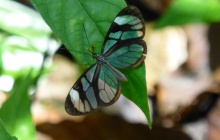 After breakfast, we will head to the Arenal region. Upon arriving to our destination, we will begin discovering Danaus Eco-center. This place was originally plains for cattle, but it was completely reforested and protected. Therefore, it has repopulated. At our own pace, we will discover the Malekus cultural center, their medicinal plant garden, and their frog and butterfly gardens.
After breakfast, we will head to the Arenal region. Upon arriving to our destination, we will begin discovering Danaus Eco-center. This place was originally plains for cattle, but it was completely reforested and protected. Therefore, it has repopulated. At our own pace, we will discover the Malekus cultural center, their medicinal plant garden, and their frog and butterfly gardens.
Transportation: 3-4 hours by bus.
Accommodation: Hotel.
Meal(s) at the client's expense: No.
Hike duration: 1-2 hours -
Day 3 ARENAL VOLCANO NATIONAL PARK- FAMILY-RUN AGRICULTURAL FARM
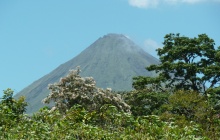 A part of this day is dedicated to exploring Arenal Volcano National Park. This park's trail is the perfect example of forest regeneration; if the weather is favorable, we will be able to ascend above a lava flow and admire the splendid volcano's perfect cone shape on one side, and an artificial lake, the source of a large part of the energy consumed in the country, on the other. We will have lunch on an estate before visiting the farm.
A part of this day is dedicated to exploring Arenal Volcano National Park. This park's trail is the perfect example of forest regeneration; if the weather is favorable, we will be able to ascend above a lava flow and admire the splendid volcano's perfect cone shape on one side, and an artificial lake, the source of a large part of the energy consumed in the country, on the other. We will have lunch on an estate before visiting the farm.
Transportation: 1-2 hours by bus.
Accommodation: Hotel.
Meal(s) at the client's expense: No.
Hike duration: 3-4 hours -
Day 4 CARARA NATIONAL PARK - TARCOLES
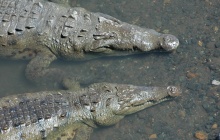 Today, we are going to the Central Pacific to Tarcoles village, which is famous for is abundance of marine life, such as the gigantic crocodiles that we will observe from the bridge that gets its name from the town. On the way, we will stop and visit the small Carara National Park and later, we will visit the fishing community in Tarcoles to discover their daily routine. At night, we will settle into a family's house in the village and share delightful moments of togetherness.
Today, we are going to the Central Pacific to Tarcoles village, which is famous for is abundance of marine life, such as the gigantic crocodiles that we will observe from the bridge that gets its name from the town. On the way, we will stop and visit the small Carara National Park and later, we will visit the fishing community in Tarcoles to discover their daily routine. At night, we will settle into a family's house in the village and share delightful moments of togetherness.
Transportation: 3-4 hours by bus.
Accommodation: Family home
Meal(s) at the client's expense: No.
Hike duration: 2-3 hours -
Day 5 BOAT EXCURSION ON TARCOLES RIVER - FREE AFTERNOON
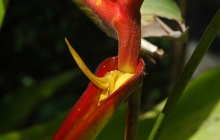 This morning, we are going to go on a boat excursion on Tarcoles River to discover the fauna and flora. With a little bit of luck, we will see gigantic crocodiles, excitement guaranteed! Our afternoon is free to enjoy a bit of rest or activities (to be paid), such as scuba diving and artisanal fishing (approx $120), adventure circuit (approximately $100)...
This morning, we are going to go on a boat excursion on Tarcoles River to discover the fauna and flora. With a little bit of luck, we will see gigantic crocodiles, excitement guaranteed! Our afternoon is free to enjoy a bit of rest or activities (to be paid), such as scuba diving and artisanal fishing (approx $120), adventure circuit (approximately $100)...
Transportation: 3-4 hours by bus.
Accommodation: Family home
Meal(s) at the client's expense: No.
Hike duration: 2-3 hours -
Day 6 MANUEL ANTONIO NATIONAL PARK- PLAYA BLANCA
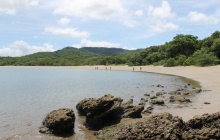 This morning, we head to the southern coast towards the Osa Peninsula. On the way, we will visit Manuel Antonio National Park. We will begin our hike on the trail that ascends to the viewpoint between the park and the ocean, and if time allows, we will swim in the park's beautiful beach. Manuel Antonio is a very developed place, and rather frequented. However, wildlife observation is extraordinary. At the end of the afternoon, we will settle into the relaxing shores of ''Golfo Dulce'' At night, you may have the opportunity to play with luminous plankton.
This morning, we head to the southern coast towards the Osa Peninsula. On the way, we will visit Manuel Antonio National Park. We will begin our hike on the trail that ascends to the viewpoint between the park and the ocean, and if time allows, we will swim in the park's beautiful beach. Manuel Antonio is a very developed place, and rather frequented. However, wildlife observation is extraordinary. At the end of the afternoon, we will settle into the relaxing shores of ''Golfo Dulce'' At night, you may have the opportunity to play with luminous plankton.
Transportation: 4-5 hours by bus.
Accommodation: Hotel.
Meal(s) at the client's expense: No.
Hike duration: 1-2 hours -
Day 7 CORCOVADO NATIONAL PARK, LA LEONA
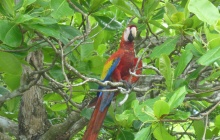 Our day is dedicated to visiting the famous and beautiful Corcovado National Park that we traverse through the trails in La Leona. This park has the largest rainforest on the American Pacific coast: waterfalls, crystal-clear pools and exuberant wildlife await you. With a little luck, we will have the opportunity to observe a large variety of birds, including red macaws and maybe jaguars and tapirs. Return to our lodge in the afternoon to see the sun set over the sea...
Our day is dedicated to visiting the famous and beautiful Corcovado National Park that we traverse through the trails in La Leona. This park has the largest rainforest on the American Pacific coast: waterfalls, crystal-clear pools and exuberant wildlife await you. With a little luck, we will have the opportunity to observe a large variety of birds, including red macaws and maybe jaguars and tapirs. Return to our lodge in the afternoon to see the sun set over the sea...
Transportation: 1-2 hours by bus.
Accommodation: Lodge.
Meal(s) at the client's expense: No.
Hike duration: 2-3 hours -
Day 8 MASK WORKSHOP WITH THE INDIGENOUS BORUCAS - DOTA
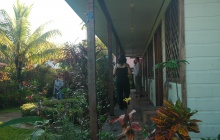 Today, we will head towards the city of Dota. On the way, we will stop where the indigenous Borucas live and they will teach us the art of mask making, which has a great cultural weight on the life of these natives, but is mainly known for the party called ''Los Diablitos'' which is celebrated in December. Later, we will share a delicious traditional lunch prepared by the Borucas.
Today, we will head towards the city of Dota. On the way, we will stop where the indigenous Borucas live and they will teach us the art of mask making, which has a great cultural weight on the life of these natives, but is mainly known for the party called ''Los Diablitos'' which is celebrated in December. Later, we will share a delicious traditional lunch prepared by the Borucas.
Transportation: 3-4 hours by bus.
Accommodation: Hotel.
Meal(s) at the client's expense: No.
Hike duration: 1-2 hours -
Day 9 IN SEARCH OF THE QUETZAL - FAMILY GATHERING- TURRIALBA
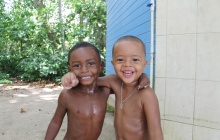 In the morning, we will set off on a short hike in hopes of seeing the majestic and mythical Quetzal. On the way, we will stop in the Tucurriqu community, where Daisy and her family live. They will prepare us a lunch based on small regional specialities and will show us their daily life. Once again we take our route and end our day in Pavones de Turrialba with a family. There, we will spend the night on a farm.
In the morning, we will set off on a short hike in hopes of seeing the majestic and mythical Quetzal. On the way, we will stop in the Tucurriqu community, where Daisy and her family live. They will prepare us a lunch based on small regional specialities and will show us their daily life. Once again we take our route and end our day in Pavones de Turrialba with a family. There, we will spend the night on a farm.
Transportation: 3-4 hours by bus.
Accommodation: Guest house
Meal(s) at the client's expense: No.
Hike duration: 1-2 hours -
Day 10 CAHUITA NATIONAL PARK - CARBON
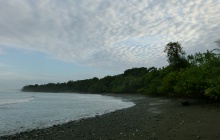 After breakfast, departure to the Caribbean coast. Upon our arrival, we will visit Cahuita National Park and have a picnic along the sea. This park is fascinating because it combines sea with coral reef, beach, coconut trees, rainforest and rich wildlife. If the weather is favorable, it is possible to swim. In the late afternoon, we will settle into our lodge situated in a green area where Sandra will prepare us a traditional dish whose secret only she possesses.
After breakfast, departure to the Caribbean coast. Upon our arrival, we will visit Cahuita National Park and have a picnic along the sea. This park is fascinating because it combines sea with coral reef, beach, coconut trees, rainforest and rich wildlife. If the weather is favorable, it is possible to swim. In the late afternoon, we will settle into our lodge situated in a green area where Sandra will prepare us a traditional dish whose secret only she possesses.
Transportation: 3-4 hours by bus.
Accommodation: Hotel.
Meal(s) at the client's expense: No.
Hike duration: 2-3 hours -
Day 11 FREE DAY
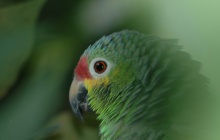 Today, we will enjoy a day to do what we want. For example, we can go to the small village of Puerto Viejo, which, with less than ten kilometers, offers a large quantity of beaches and activities. You can go to the ''jaguar rescue'' wildlife refuge, which is home to hundreds of species of wildlife. You can rent bicycles (around $15-20/day), take cooking or dancing classes (around $40), kayak (approximately $70) or snorkel (around $65...).
Today, we will enjoy a day to do what we want. For example, we can go to the small village of Puerto Viejo, which, with less than ten kilometers, offers a large quantity of beaches and activities. You can go to the ''jaguar rescue'' wildlife refuge, which is home to hundreds of species of wildlife. You can rent bicycles (around $15-20/day), take cooking or dancing classes (around $40), kayak (approximately $70) or snorkel (around $65...).
Transportation: 1-2 hours by bus.
Accommodation: Hotel.
Meal(s) at the client's expense: Lunch. -
Day 12 YORKIN, MEETING WITH INDIGENOUS BRIBRI
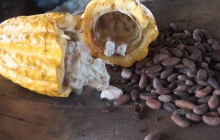 This morning, we will go to the small village of Bambu to go on canoes that will take us to Yorkin where the indigenous Bribris live. We will disembark at the school level and take the main route to cross the native community composed of wooden houses dispersed in the forest. This place is totally adapted to its environment and our hosts show us some of their customs: weaving natural fibers, using bows and arrows, and finally, cocoa tasting. At night, we will sleep in a small, dormitory-style lodge with simple comfort, but it is very charming.
This morning, we will go to the small village of Bambu to go on canoes that will take us to Yorkin where the indigenous Bribris live. We will disembark at the school level and take the main route to cross the native community composed of wooden houses dispersed in the forest. This place is totally adapted to its environment and our hosts show us some of their customs: weaving natural fibers, using bows and arrows, and finally, cocoa tasting. At night, we will sleep in a small, dormitory-style lodge with simple comfort, but it is very charming.
Transportation: 1-2 hours by bus 1-2h by canoe.
Accommodation: Bribri community.
Meal(s) at the client's expense: No.
Hike duration: 1-2 hours -
Day 13 TALAMANCA - SAN JOSÉ
The time to leave has come and we sadly leave the Bribri community to find our canoes and bus to return to San Jose.
Transportation: 1-2 hours by canoe and 4-5 hours by bus.
Accommodation: Hotel.
Meal(s) at the client's expense: No.
Hike duration: 1-2 hours -
Day 14 SAN JOSE - JUAN SANTAMARIA AIRPORT
Depending on the hour of your transfer to the airport (arrive to the airport 3 hours before your flight), you can choose to visit the city: Gold Museum, Jade Museum, National Museum, Central Market, Artisan alley...
Transportation: 30 minutes-1 hour by bus.
Accommodation: No.
Meal(s) at the client's expense: Lunch and dinner.
PROGRAM MODIFICATION
Dates & prices
Departures for French-speaking groups:
No departure for now
Trip code: UCOSF1
Terms and conditions
Booking conditions
Invoice procedure
Cancellation policy
- Cancellation received more than 30 days prior to the departure date: a sum of €50 per person will be retained
- Cancellation received 30 to 21 days before the departure date: your deposit, 30% of the total trip price will be retained
- Cancellation received 20 to 14 days before the departure date: 50% of the total trip price will be retained
- Cancellation received 13 to 7 days before the departure date: 75% of the total trip price will be retained
- Cancellation received less than 7 days before the departure date: 100% of the total trip price will be retained
- Fixed airfares: if your airline ticket was issued in advance, often done to avoid significant surcharges, you will be charged 100% of any non-refundable fees if you wish to change or cancel your flight plan.
- Fixed in-country costs: early charges for firm bookings will be charged if you cancel or modify your trip.
- Insurance costs: if you have taken out comprehensive or cancellation insurance, the cost of insurance is due and cannot be refunded.

